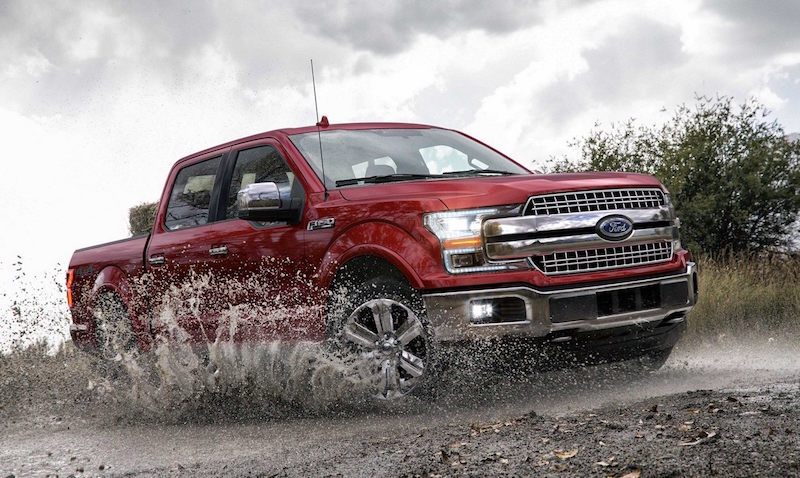July 11, 2019
The All-New Ranger and F-150 chart winning path according to new study
11 July 2019 [Santa Rosa, CA] – The Automotive Science Group (ASG) released its truck findings today from the 2019 Automotive Performance Index (API) study, with the All-New Ford Ranger and Ford F-150 topping the index in both the mid and full-size truck segments.
ASG’s 2019 Study assessed all light-duty trucks available in North America, and found the lightweight aluminum designed Ford F-150 to lead the full-size truck competition in all performance areas, earning ASG's Best All-Around Performance honor. According to ASG, the F-150 holds the smallest life-cycle carbon footprint and lowest cost of ownership of any full-size truck in the North American market today.
The idea of light-weighting is not revolutionary in and of itself, it’s basic physics – reduced vehicle weight requires less power to physically move the vehicle, thus encouraging the use of smaller fuel efficient engines, as found in the 2.7L EcoBoost. What is groundbreaking however, is Ford Motor Company’s ability to implement its light-weighting strategy with economies of scale that makes the F-150 not only price competitive, but in fact the industry leader with the lowest combined purchase and operating costs of any full-size truck in 2019.
“Ford produces a lightweight aluminum intensive truck that costs less and performs better than its conventional truck counterparts across its life-cycle - this is a testament to Ford’s forward thinking truck strategy that continues to elevate the brand’s truck offerings over the competition, with all things considered,” said Colby Self, Automotive Science Group’s managing director.
Life-cycle thinking is an important consideration when making accurate vehicle comparisons, especially when material compositions are vastly different, and when vehicles are powered by different fuel sources. While aluminum is more energy intensive to produce, its lightweight properties can provide advantages in automotive applications. Further, diesel fuel, for example, has a higher energy content per gallon than gasoline, but due to the higher density of diesel, it also releases more CO2-e emissions per gallon combusted.
This disadvantage can be overcome in diesel configurations with greatly improved fuel economy, but the current 3 MPG advantage the 3.0L Power Stroke Turbo Diesel promises over the Ford 2.7L EcoBoost is not sufficient to offset life-cycle CO2-e emissions, holding a 2% greater environmental burden. However, according to ASG’s assessment, if Ford can increase the Turbo Diesel’s combined (city/hwy) fuel rating advantage by 1 MPG in future years, the diesel variant will be the environmentally preferred option.
It must be noted that the Ford F-150 3.0L Power Stroke Turbo Diesel variant holds the best combined fuel rating of any 2019 truck, at 25 MPG combined (city/hwy), outperforming even the mid-sized Chevrolet Colorado’s 2.8L Turbo Diesel at 23 MPG combined. However the emissions and disproportionate price premium for these diesel variants, push their environmental and economic performance beyond practical consideration in 2019, according to ASG’s assessment.
ASG’s findings point to the F-150 2.7L EcoBoost, with the smallest carbon footprint in the full-size truck segment, earning ASG’s Best Environmental Performance Award. ASG found the F-150 equipped with the 2.7L EcoBoost to produce 12% less CO2-e emissions across its life-cycle, as compared to the average full-size truck [accounting for resource extraction, processing, vehicle assembly, delivery, use with upstream fuel phases, and end-of-life management]. Further, the F-150's 22 MPG (city/hwy combined) bests the average 20 MPG (city/hwy combined) for the segment, a 2 MPG advantage that is significant over time - reducing fuel costs by $1,915 over the first 78 months of operation, and reducing CO2-e emissions by nearly 25,000 pounds over the vehicles lifetime.
In ASG's economic assessment, the F-150 holds claim to the lowest cost of ownership when considering purchase and operating costs across the first 6.5 years, earning ASG's Best Economic Performance Award. This is a tribute to the F-150's light weighting strategy combined with the fuel efficient 3.3L V6, a combination that beats the average full-size truck with a 10% cost advantage (purchase and operating costs over the first 6.5 years - 87,594 miles for the average new truck buyer).
In the Mid-size truck segment, the much anticipated return of the Ford Ranger shook up this growing segment. The All-New Ford Ranger swept the mid-size truck segment earning ASG's Best Environmental Performance, Best Economic Performance and Best All-Around Performance Awards. ASG’s findings show the Ranger producing 7% less CO2-e emissions across its life-cycle (514 grams of CO2-equivalent emissions per mile driven lifetime) as compared to the average mid-size truck. The Ranger also came in with 7% lower ownership costs over the first 6.5 years.
With 23 MPG (city/hwy combined), the Ranger has the best MPG rating in the segment, only matched by the Chevrolet Colorado's 2.8L Turbo Diesel. However on the whole, the Ranger crushes the diesel powered Colorado with a 27% cost advantage, that's over $14,000 in savings for the new truck buyer, and 13% less CO2-e emissions life-time.
To access the 2019 API Study findings and list of top selections and analysis, please visit THE STUDY.
Leave a comment
Comments will be approved before showing up.





